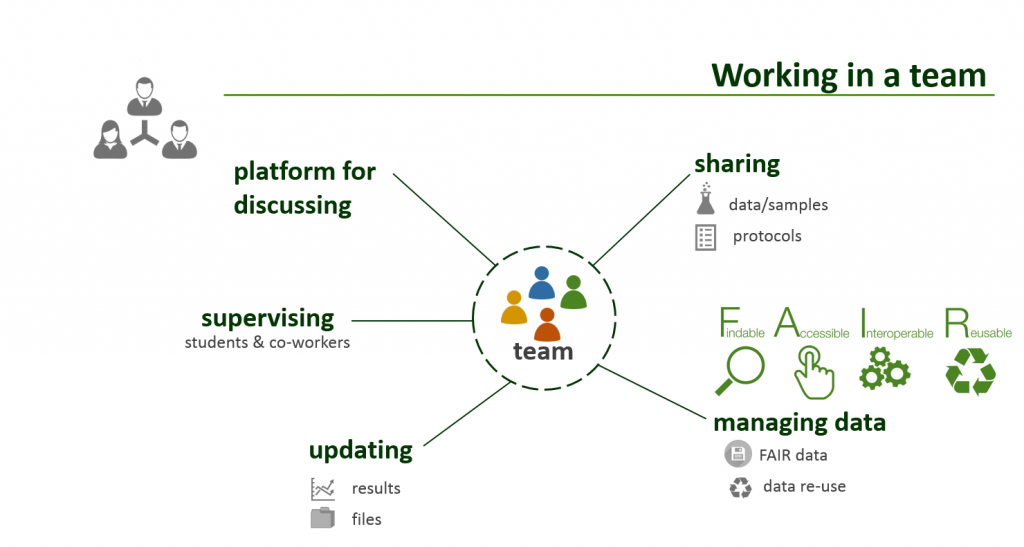WUR Data Champions Katharina Hanika & Eliana Papoutsoglou: actively promoting good data management practices
Have you ever watched the short story on the panda bear that would like to use data from her colleague? If not, check out the 4-minute ‘data management horror story’ made by the NYU Health Sciences Library here. A personal experience comparable to the panda story triggered PhD candidates Katharina Hanika and Eliana Papoutsoglou to devote a lot of their time to inform their colleagues about good data management practices.

Katharina Hanika

Eliana Papoutsoglou
Katharina started working on her PhD in September 2016. Her research partly takes place at the Laboratory of Plant Breeding and partly at the Laboratory of Phytopathology, where she spends most of her time in the greenhouse and laboratory doing experiments on the interaction between plants and pathogens. Eliana also works at the Laboratory of Plant Breeding. The focus of her PhD is to design and evaluate a standard in plant breeding data in accordance with the FAIR principles (Findable, Accessible, Interoperable, Reusable). This work also includes contributions to the Elixir project, which has the overall goal to coordinate, integrate and sustain bioinformatics resources across Europe. Katharina and Eliana came together because of their common passion about good research data management.
Before the research
I worked with a publicly available dataset. Whatever I did, I wasn’t able to reproduce the results. Only through contacting the author I could identify a mistake in the labelling of the files.
Both Katharina and Eliana encountered a situation where good data management could have saved them time and frustration. As a first step in her PhD, Katharina wanted to reproduce the results of another author by using his data. Katharina: “I worked with a publicly available dataset. Whatever I did, I wasn’t able to reproduce the results. Only through contacting the author I could identify a mistake in the labelling of the files.” Eliana saw a similar problem when she witnessed how potato population data were used by different researchers. Eliana: “It was not clear who had worked on which part of the data, where the results were stored, and what changed when the data moved to a new user. This resulted in researchers working on older data because they were not aware that there were newer versions.” In search of a way of storing and managing her research data in such a way that nobody would have to go through the frustration that she went through, Katharina became an avid user of an electronic lab notebook (Bio-itech eLabjournal). In fact, after two years of experience, she has become the local eLabjournal expert, actively promoting its use and giving workshops that she developed together with Eliana.
During research: data storage and sharing

A slide from Katharina’s presentation, summarizing the advantages of the use of an Electronic Lab Notebook when working in a team
There are many advantages of using an electronic lab notebook. First of all, it is 100% digital, so no risk of losing your paper notebook or not understanding your own scribbles of last year. The information that you enter (be it sample locations, raw data, information about the experimental process or results) is stored in a structured way, which means that you will easily find it back. In addition, you can share your notebook with colleagues or your promotor, which improves collaboration, serves as proof of what you have done, and reduces errors in for example, copying data. Additional pros are the ability of sharing not only data but also protocols, easy updating of results and storing your files in a logical way. These are all part of FAIR data management. Katharina and Eliana give workshops on eLabjournal nearly every two months, because, as Katharina states: “New PhD students and other colleagues deserve to make use of the data that we collect without any problems. I am convinced that using an electronic notebook improves data management. Although the workflow may be a little slower because of maintaining the lab notebook, my data are better organized than before.”
WUR has a license for the e-lab journal application which Katharina uses. Would you also like to use the e-lab notebook application, please approach data management support through data@wur.nl, and we will provide you with information on the costs and the procedures.
After research: Archiving data
Katharina and Eliana already have ideas on what must happen to their data after they finish their research. In any case, they agree that the data must be archived in file formats that can be opened in the future and with sufficient metadata, so that the next generation PhD students can benefit from their work (most data repositories ask that you deliver your data in their preferred file formats). As they are only halfway their PhDs, they have their own research to focus on for now. With all the additional work they do to promote electronic lab notebooks and good data management in their own time, they are true WUR data champions!
WUR is serious about data
With this series on WUR Data Champions, we show you how some pioneers within our organization work on the implementation of the new RDM policy. Not every step is perfect; the championship lies in the serious effort and engagement. Please also read the blogposts on the other WUR data champions. And stay tuned: more data champions are to come!
Data Management Support
Do not hesitate to contact Data Management Support with any questions you may have. You can also join the Research Data Management group on Intranet to stay informed.

